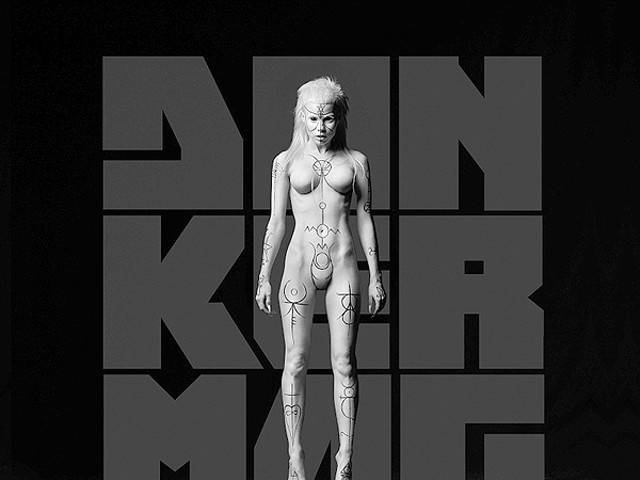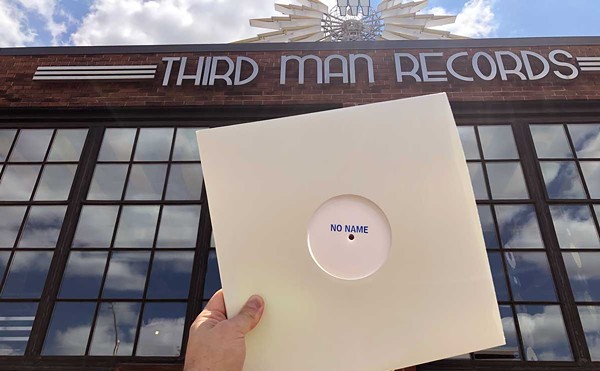It's very easy to miss the Archer Records plant. There's no big sign, no real indication of the historic value of the place. Just the name of the company crudely painted on the front of the building. Entering the plant through the gated side door reveals that the inside is no more spectacular. This is essentially a plastic shop, not a hotbed of artistic creativity. The machines may be churning out records, but they could just as easily be producing another product.
Those machines do hold a certain mystique though, despite their cold, ugly appearance. First of all, they were made in the 1970s — nobody makes record pressing machines anymore (why would they?) and so there is no tech support if these old beasts break down. Current owner Mike Archer, and his dad Joe Archer before him, quickly had to learn how to get them running again by themselves when something went wrong.
But even beyond that, only the most steel-hearted would be able to look around the shop floor and not wonder about the vast quantities of incredible music that has been pressed in this most unassuming place. After all, Archer Pressing will be celebrating its 50th year of operations in 2015. Gospel, R&B, punk, hip-hop and, more recently, electronic music — all of it has exited these doors on vinyl.
Mike Archer entered the family business two decades ago, despite serious efforts not to. "This was not the plan," he says. "I went to Michigan State and, after I graduated, I worked for a couple of different auto suppliers. After I left the second one, my dad said, 'I really need some help here.' I said that I'd come down for the summer, and I'm still here. As you can see, it's not the most glamorous work — it's a shop. I didn't want to do it, but here I am. There's definitely some pride, knowing that you're helping the music industry. The customers are great too, for the most part. They do appreciate what we do here and they like having us here, so that helps a lot."
It's astounding that Archer remains the only record pressing plant in Detroit, yet the company regularly has to turn away business. You would imagine somebody would be eager to fill that hole, though Mike tells us that those machines are practically impossible to buy nowadays, making the start of a new venture extremely difficult.
"Back in 1965, there was no pressing plants here in Detroit," he says. "We were the first one, and we're still the only one. With Motown here, you would think there'd be a pressing plant here, but there wasn't. There was an independent plant [the American Record Pressing Company] out in Owosso, which is between Lansing and Flint. They did a bit of Motown work. Motown spread it out. Back in the day, they would make their records regional. For the Californian market, they would press them in California, for the East Coast market, they'd press them on the East Coast, just to lower the transportation charges. Here in the Midwest, we had that plant here in Owosso. As far as being in Detroit, we've always been the only one."
Mike's grandfather Norman Archer started the company in 1965, back when Detroit was crying out for a local pressing plant. The industry has changed significantly since then, of course, with eight-tracks, cassettes, CDs and now electronic downloads all threatening vinyl's market share. Archer has managed to hang on throughout it all.
"The nice thing about this business is we don't have to advertise," he says. "People find us through word of mouth. The music industry's pretty tight and people talk. They say, 'I like your record, where did you get it pressed?' They send them over here to Archer, and then they'll come and see me. Detroit is a great music city. People like to keep things local, there's a lot of Detroit pride so a lot of people like to keep things right here in Detroit. That helps us also."
As he gives us a short tour of the shop floor, showing us the tiny chips of vinyl that are scooped into a machine's funnel, melted down into a puck-shaped object, and then pressed flat into a record. Mike seems tired after a long, hard day's work, but also still immensely proud of the work that he continues to do in his family's name. The nature of the business has changed, but the quality work that Archer does and the emphasis the company places on local music remains the same.
"We're not pressing like back in the 1960s and '70s," he says. "We press a lot of electronic music records now though, and we turn business away all the time. If we've worked with you before or you're from Detroit, we'll work with you. If you approach us for the first time from Chicago or somewhere, we might not be able to fit you in. As far as downloading and streaming, it's a different way for people to get the files to us to press the record. On our end, pressing the record is the same as it's always been. We put it on the press, the press closes at about 100 tons, and you smash out those records. As the CDs have gone away and the downloading came in, I think that's actually helped. People now want a physical product and they don't want to buy CDs because they already have it on their iPod. So if they want something physical, they'll get a record made."
And long may it continue. mt





